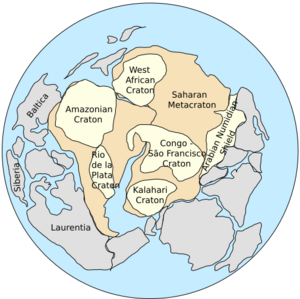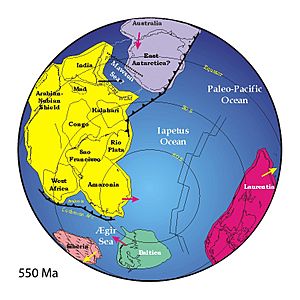Pannotia facts for kids
Pannotia was a huge landmass, like a giant puzzle made of many continents joined together. Scientists call these giant landmasses "supercontinents." Pannotia existed a very, very long time ago, during a period called the Neoproterozoic Era. This was roughly 600 to 541 million years ago, in a time known as the Ediacaran period.
Pannotia didn't last forever. It eventually broke apart into several smaller continents. These included Laurentia, Siberia, and Baltica. The biggest piece that broke off was a large landmass called Gondwana, which was located to the south.
How Pannotia Formed
Before Pannotia, there was an even older supercontinent called Rodinia. About 750 million years ago, Rodinia started to break apart. It split into three large pieces. These pieces were early versions of what we now know as Laurasia and Gondwana, plus a large stable part of the Earth's crust called the craton of Congo.
Around 600 million years ago, these separate landmasses came back together. They collided and joined up to form the supercontinent Pannotia.
Why Pannotia Broke Apart
Pannotia did not last for a very long time. The way the continents crashed together to form Pannotia was not very strong. Also, the landmasses that made up Pannotia were already starting to pull apart in places. This pulling apart is called "rifting."
By about 550 million years ago, Pannotia had already separated into four main continents. This happened only about 50 million years after it first formed! Much later, these landmasses would join up again to create the most recent supercontinent, Pangaea.
Related Topics
- You can see an image of Pannotia by Christopher Scotese. (In the image, it's called the late Precambrian Supercontinent).
Images for kids
-
An artist's impression of Pannotia, about 600 million years ago, in the Ediacaran period.
See also
 In Spanish: Pannotia para niños
In Spanish: Pannotia para niños





